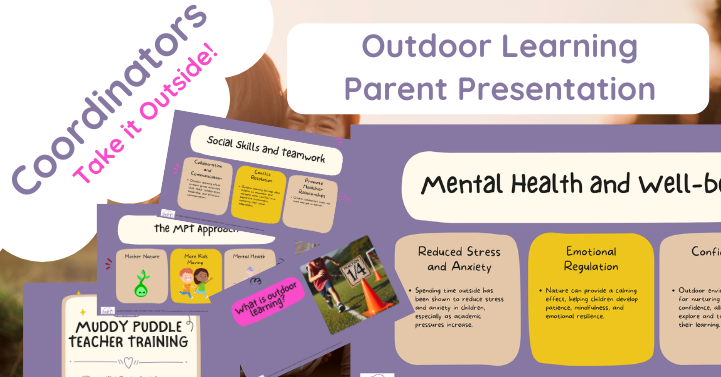Outdoor Learning PowerPoint Presentation: Empowering Parents to Embrace Nature-Based Education 🌿✨
Unlock the benefits of outdoor learning with our engaging PowerPoint Presentation, designed to help parents understand why stepping outside is essential for their child’s growth, development, and well-being.
This resource is packed with evidence-based insights, practical tips, and inspiring ideas to showcase the value of learning beyond the classroom walls. 🌳👦👧
🌟 Key Features:
- Educational Benefits: Discover how outdoor learning boosts creativity, problem-solving skills, and emotional resilience.
- Health & Well-Being: Learn how connecting with nature supports mental and physical health.
- Practical Tips: Simple ways parents can encourage outdoor play and learning at home or in the community.
- Visual Inspiration: Eye-catching slides with real-world examples of outdoor activities.
Perfect for schools, nurseries, and community groups to use in parent workshops or home learning sessions.
📥 Download today and inspire parents to embrace the joys of outdoor learning!
🌿 Nature is the best classroom—help families make the most of it! 🌟
n today’s digital age, children are spending more time indoors, often engaged with screens, leading to concerns about their physical and mental well-being. Encouraging outdoor activities is essential for holistic development. Here are several compelling reasons why parents should prioritize taking their children outdoors:
1. Physical Health Benefits
Outdoor play promotes physical fitness, helping children develop motor skills, coordination, and balance. Engaging in activities like running, jumping, and climbing strengthens muscles and bones, reducing the risk of childhood obesity. According to the American Academy of Pediatrics, regular outdoor play is crucial for children’s health.
2. Mental and Emotional Well-being
Exposure to natural environments has been linked to reduced stress, anxiety, and depression in children. The Children’s Hospital of Philadelphia highlights that outdoor play allows children to explore, take risks, and develop resilience, contributing to better emotional health.
3. Cognitive Development
Outdoor activities stimulate curiosity and creativity, enhancing problem-solving skills and attention spans. Harvard Health Publishing notes that unstructured outdoor play encourages children to think independently and develop decision-making skills.
4. Social Skills and Peer Interaction
Playing outside often involves group activities, teaching children cooperation, communication, and conflict resolution. The Early Years Alliance emphasizes that outdoor play offers opportunities for children to practice empathy and develop an understanding of others.
5. Connection with Nature
Spending time outdoors fosters a connection with the environment, instilling a sense of responsibility and appreciation for nature. The Nature Conservancy points out that children who engage with nature are more likely to become environmentally conscious adults.
6. Vitamin D Exposure
Sunlight is a natural source of Vitamin D, essential for bone development and immune function. Harvard Health Publishing explains that moderate sun exposure helps children maintain adequate Vitamin D levels, supporting overall health.
Incorporating regular outdoor activities into your child’s routine can bring numerous benefits, from improved physical health to enhanced social skills. By prioritising time outside, parents can meaningfully support their children’s development and well-being.


